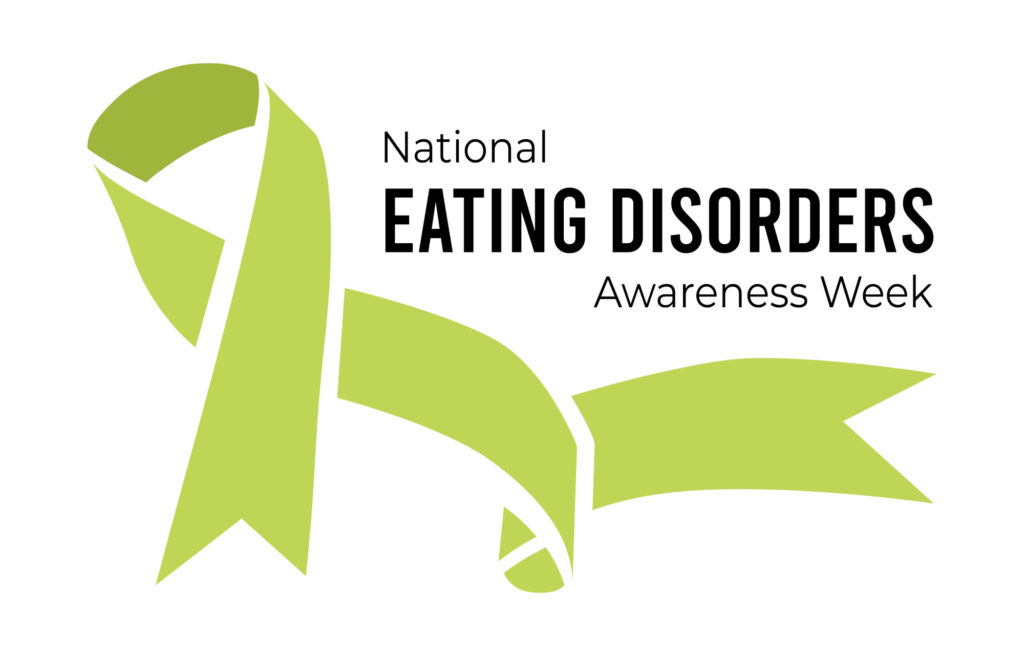Eating disorders impact millions of people worldwide. According to the National Association of Anorexia Nervosa and Associated Disorders, “An estimated 9% of the U.S. population, or 28.8 million Americans, will have an eating disorder in their lifetime.”
February 28th marks the beginning of National Eating Disorders Awareness Week, a crucial time for spotlighting this critical issue. This week is dedicated to educating the public about the realities of eating disorders, which are complex mental health conditions, and to dispel the myths and stigma that often surround them. Eating disorders are not simply about food or losing weight— they involve a range of psychological, physical, and emotional complexities. This week is a time to recognize the signs and symptoms of these disorders, which can often go unnoticed or be misunderstood, emphasize the importance of early intervention and the effectiveness of treatment, and encourage those who are struggling to seek help.
If your teen is struggling with an eating disorder, this week is the perfect time to take action. Here are six steps you can take:

#1: Educating Yourself and Others
Educating yourself and others about eating disorders is a fundamental step in both prevention and support for those affected. This education involves understanding the diverse types of eating disorders, their symptoms, causes, and impacts. Dispelling myths and stereotypes about eating disorders is equally important, as it fosters a more inclusive and accurate understanding that these disorders can affect anyone, regardless of their background or lifestyle. Knowledge leads to empathy and reduces stigma, creating a supportive environment where those struggling feel safe to seek help. This widespread education and awareness not only aids in early intervention and effective treatment, but also contributes to a societal shift towards more compassionate and effective approaches to dealing with eating disorders.
Action Step: Read up on eating disorders from reliable sources or attend a webinar or workshop.

#2: Encouraging Open Communication
Open communication creates a supportive environment where your teen can feel safe to express their struggles and seek help. Open dialogue helps break down the stigma and isolation often associated with these disorders, allowing those affected to share their experiences without fear of judgment or misunderstanding. This transparency fosters a better understanding among family, friends, and caregivers, enabling them to offer the appropriate support and empathy. It also facilitates early intervention, as open conversations can reveal warning signs that might otherwise go unnoticed. For those battling eating disorders, being able to openly discuss their feelings and challenges is therapeutic and can be an integral part of the healing process.
Action Step: Start a conversation with your teen about the importance of mental health and body positivity.

#3: Promoting Healthy Body Image
Promoting a healthy body image is crucial in helping teens combat and recover from eating disorders. It counters the pervasive societal and media-driven standards that often glorify unrealistic and unhealthy body types, which can be a significant trigger for eating disorders. By fostering an environment that celebrates diverse body shapes and sizes and emphasizes the value of individuals beyond their physical appearance, teens can develop a more positive and realistic self-image. This shift in perspective helps reduce the pressure to conform to narrow beauty standards, decreasing the risk of developing unhealthy eating behaviors. Encouraging teens to appreciate their bodies for their functionality and strength, rather than just aesthetics, nurtures self-esteem and body acceptance. A positive body image is linked to better overall mental health and can be a protective factor against the development of eating disorders, while also supporting recovery for those who are struggling.
Action Step: Compliment your teen on qualities other than appearance, like their kindness, skills, or achievements.

#4: Supporting Mental and Physical Health
Supporting both mental and physical health is integral to helping teens manage or recover from eating disorders. This holistic approach recognizes that eating disorders are not just about food or weight, but are deeply rooted in psychological factors. Addressing mental health through therapy, counseling, and emotional support helps in tackling the underlying issues such as anxiety, depression, or low self-esteem that often contribute to the development of eating disorders. Simultaneously, nurturing physical health through proper nutrition, medical care, and healthy exercise promotes the restoration of physical well-being, which is often compromised in these conditions. This dual focus helps in re-establishing a balanced and healthy relationship with food and body image. Encouraging practices like mindfulness, stress management, and self-care activities further aids in developing coping mechanisms for emotional regulation.
Action Step: Engage in activities that make you feel good, like yoga, art, or journaling, rather than focusing on appearance.

#5: Participating in Awareness Activities
Educational campaigns, workshops, and community events not only spread vital information but also foster a sense of solidarity. For teens struggling with eating disorders, involvement in these events can be empowering, as it helps reduce the stigma and isolation they often feel. Seeing and participating in a collective effort to understand and address eating disorders can provide a sense of hope and belonging. It also offers opportunities for teens to connect with others who have similar experiences, facilitating peer support which is invaluable in recovery. These activities also raise public awareness, leading to better understanding and empathy from family, friends, and society. This heightened awareness can improve the support system for affected teens, making it easier for them to seek and receive help, and promoting a more informed and sensitive approach to dealing with eating disorders in the broader community.
Action Step: Participate in or organize an event to raise awareness about eating disorders.

#6: Seeking Professional Help
Professionals such as therapists, psychologists, and dietitians have the expertise to diagnose and treat eating disorders, tailoring their approach to the individual’s specific needs. Therapy sessions provide a safe space for teens to explore and address the underlying psychological issues that contribute to their disorder, such as body dysmorphia, low self-esteem, or trauma. Dietitians can offer guidance on healthy eating patterns and nutritional needs, helping to restore physical health and correct misconceptions about food. In more severe cases, medical professionals can monitor and treat the physical health complications that often accompany eating disorders. This comprehensive and integrated approach ensures that all aspects of the disorder are addressed, leading to a more sustainable recovery. Professional intervention often includes family therapy, educating and involving family members in the recovery process, which is crucial for creating a supportive home environment conducive to healing.
Action Step: If you or someone you know is struggling, reach out to us at Evolve for help. We specialize in teen eating disorder treatment, and can help get your child on the right track.
National Eating Disorders Awareness Week is more than an annual observance; it’s an opportunity to make a real difference in the lives of those affected by these complex conditions. This week, let’s take proactive steps to educate ourselves, offer support, and advocate for better understanding and treatment of eating disorders, contributing to a healthier, more informed society.






